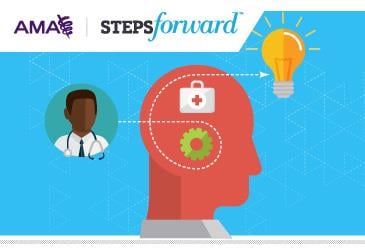
Engaging patients in behavior changes can improve their overall health and reduce the amount of medical care they need, but it’s often difficult for physicians to find the extra time to collaborate and plan these types of strategies. Trained health coaches can take on a lot of these responsibilities to advance lifestyle changes, prevention and patient health.

Having a health coach involved in a patient’s care can not only increase patient satisfaction and engagement but also reduce physician stress and burnout by freeing up time.
In the AMA’s STEPS Forward™ collection of practice improvement strategies, primary care physician Thomas Bodenheimer, MD, provides insights into implementing health coaching in your practice. Dr. Bodenheimer is a professor of family community medicine at the University of California San Francisco School of Medicine and contributed this module after winning the AMA-MGMA Practice Innovation Challenge.
You don’t need to look far to find a health coachA health coach can bring an extra boost to your practice’s methods for both prevention and treatment. Health coaches may be registered nurses, licensed practical nurses, medical assistants (MA), health educators or community health workers.
You may consider transitioning a current staff member into the health coach role. Or you may consider recruiting pre-medical or pre-nursing student interns to serve as volunteer health coaches if there are not enough resources to support an additional team member. You could also train a current and loyal employee to take on the health coaching role part time.
The education of health coaches depends on the role you expect them to play. If your health coaches are going to provide clinical education, a nurse or social worker may be a good option. If they will be reinforcing the physician’s plan of care and using phone calls to keep patients on track, someone without a clinical license could acquire that skill set.
In a randomized clinical trial, MAs successfully filled the health coach role and were able to help patients improve HbA1c and LDL levels. Once your health coaching program has been established, you may opt to select patients who have met their health goals to become peer coaches. These types of coaches should have the same illness and similar backgrounds to the patients they coach.
How it’s working in OaklandAsian Health Services is a community health center that serves Asian-American and Asian immigrant patients in Oakland, Calif. After a successful health coaching pilot program, they chose to expand so that each physician is paired with a health coach.
With this type of focused teamwork, each patient gets the care they need, understands the management of their treatment and is actively engaged in their own health care. The organization provides care to a high-needs population—approximately two-thirds of their patients are on Medicaid. Many of the remaining patients are uninsured or underinsured and were determined to be especially suited to health coaching.
The health coaches at Asian Health Services are MAs who have received additional training in motivational interviewing, such as the “ask-tell-ask” technique (a sample dialogue is available for download as a tool in the STEPS Forward module), pre-visit planning, chronic illness monitoring and electronic health record management. Training is ongoing, and members of the multi-disciplinary team in each clinic lead the educational sessions.
The health coaches prep charts the day before a patient visit to see if the patient received care elsewhere between visits, review interval laboratory tests and refresh their memory using notes from the previous visit. The day of the appointment, the health coaches conduct a pre-visit huddle with the patient’s physician to discuss the upcoming visit.
During the patient visit, the coach obtains the blood pressure and performs medication reconciliation, sets the agenda and conducts action planning with the patient. After the visit, the coach meets again with the patient in the exam room to ensure he or she understands the physician’s recommendations.
The program is now active in all clinic locations, and Asian Health Services continues to evaluate and evolve their health coaching training and application. They plan to expand the health coaching program to include licensed vocational nurses who will serve patients with diabetes.
The implementing health coaching module module is one of eight new modules recently added to the AMA’s STEPS Forward collection of practice improvement strategies to help physicians make transformative changes to their practices.
Thirty-five modules now are available, and several more will be added later this year, thanks to a grant from and collaboration with the Transforming Clinical Practices Initiative.